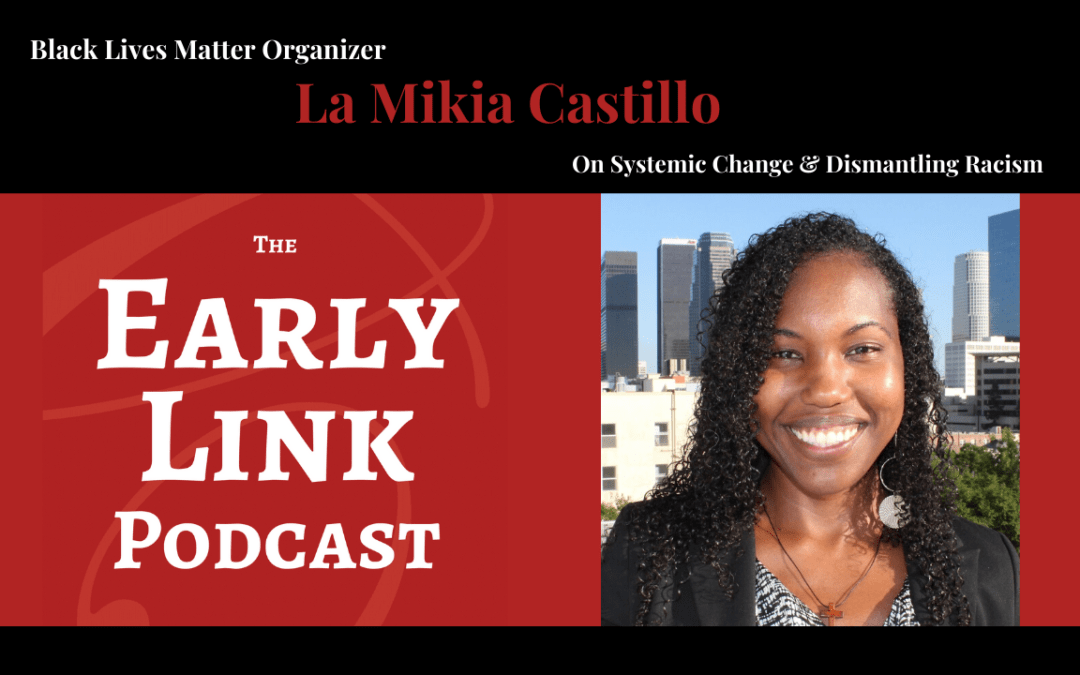
by Rafael Otto | Jun 27, 2020 | Podcast, News, Equity
In this week’s episode, host Rafael Otto talks with La Mikia Castillo, a Black Lives Matter activist and community organizer, about what it looks like to dismantle systemic racism.
Guest
La Mikia Castillo is an adjunct professor at the University of Southern California Sol Price School of Public Policy, a diversity, equity and inclusion consultant and an organizer with Black Lives Matter, Los Angeles.
Summary
Castillo clarifies the message around defunding the police and shares how we can start to reimagine a new idea of safety. She also explains the ways in which systemic racism has impacted the health and education of Black children and children of color and what it will take to see real change in these institutions. Finally, Castillo shares her idea of what a world free of racism would look like for her and her son.
Resources:
Please visit our Racial Equity Resources for Early Childhood page for more information on racial justice and equity issues that connect to early childhood. It is not comprehensive, but will be updated regularly.

by Swati Adarkar | May 31, 2020 | News, Policy Trends, Announcements, Equity
A statement from Swati Adarkar, President and CEO, and Rafael Otto, Director of Communications.
We are heartbroken by the recent loss of life in cities across America and our failure to uphold a society based on racial and economic justice.
The reasons for fury, disbelief, grief, and destruction across the country in recent days are many. Among them: the deaths of George Floyd, Ahmaud Arbery, and Breonna Taylor.
The excruciating video of a police officer slowly taking the life of George Floyd is another painful reminder of the experience that being Black in America is laced with fear and the threat of violence. During the COVID-19 crisis, it also exacerbates the pain and economic hardship experienced by the Black community. Historical trauma, institutionalized racism, and structural discrimination continue to hold America back from making real progress.
The evidence supports this. Our systems need reform, including law enforcement, health, and education. We can see that they do exactly what they are designed to do. They reinforce inequality, poor health outcomes, opportunity and achievement gaps, socioeconomic disparities, poverty, and structural bias.
It is time for our elected leaders and policymakers to act boldly and change the course of history. As Dr. Martin Luther King Jr. reminded us, silence is a form of betrayal.
In the work ahead, we must recognize that we still live in a divided America. Prosperity and opportunity are not available equitably. Disparities continue to grow. More children are living in poverty, and the basic rights of low-wage workers and families are largely being ignored.
As advocates, we will not stand by and watch in silence. We must do much more to lift up the needs of Black children and the thousands of other vulnerable children, families, and communities in the work we do, the policies we shape, and the vision we hold for a more equitable Oregon. We know that to level the playing field we must prioritize the needs of children of color, children experiencing poverty, English language learners, children with disabilities and developmental delays, children who are immigrants and refugees, children in geographically isolated communities, children in foster care, and children experiencing unstable housing.
At present, young children in Oregon are more racially and ethnically diverse than adults. We must work harder than ever to ensure that they grow up in a world that values their lives and creates the conditions for them to thrive.
We must build alliances and recommit to transforming our state and our society.
Your voice — our voices — are important. So are our actions and our votes.
We can and will make a difference, as individuals, as an organization, and as partners in the protracted struggle for justice, equality, and human rights.


